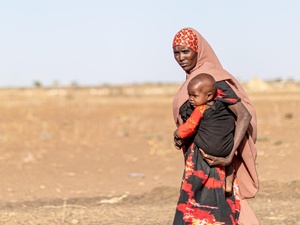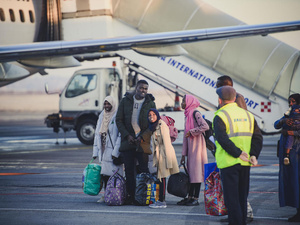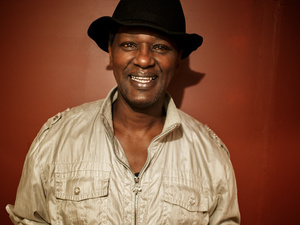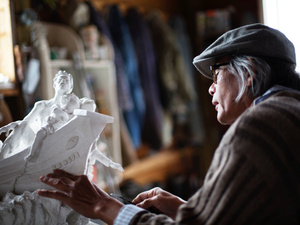Making ProGres in Bangladesh: a database yields new lives for refugees
Making ProGres in Bangladesh: a database yields new lives for refugees
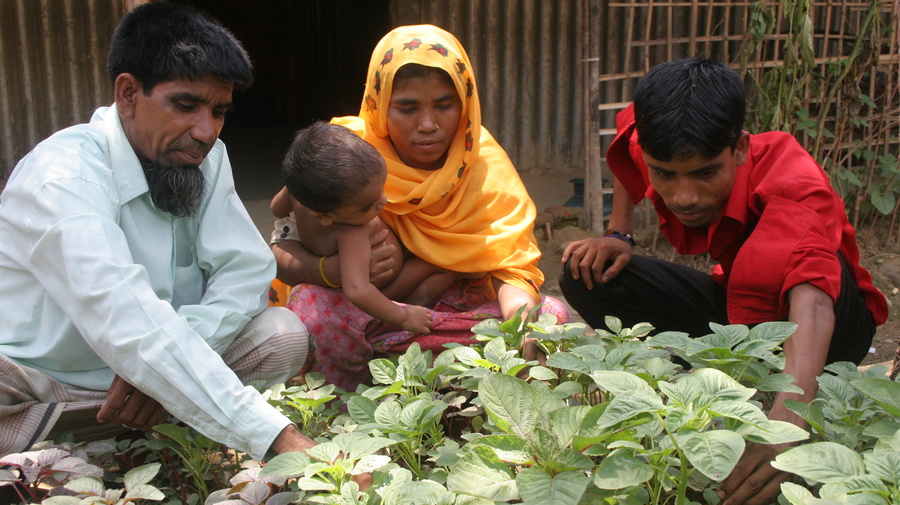
Two year old Abul Kasem, in his mother's arms, has a heart condition which is untreatable in Bangladesh. The family, refugees from Myanmar, are being resettled to the United States, where he will receive life-saving medical care.
NAYAPARA REFUGEE CAMP, Bangladesh July 7 (UNHCR) - To watch two-year-old Abul Kasem toddling cheerfully around his family's thatched shelter, you'd never guess he has a life-threatening heart problem.
Thanks to a compassionate and imaginative use of a UNHCR registration database, though, he and his family are now in line for a new life in the United States where he will be able to get the surgery and care he needs to save his life.
"If the people at UNHCR had not helped my baby, my child would have died," says mother Mabia Khatun, surrounded by her six older children and her husband. The family fled Myanmar in 1991 after repeatedly being recruited as forced labourers.
She says she knew something was wrong when Abul Kasem was only one month old, lifeless and unable to suckle. Emergency care and tests at the clinic in this camp - home to 16,500 Rohingya refugees from Myanmar - as well as at a nearby Bangladeshi hospital, revealed serious heart problems.
"They told me they could give me medicine for everything else, but heart disease they couldn't help with," Mabia Khatun says, sitting on the ground in her spotlessly clean shelter.
Abul Kasem's heart problems were further highlighted in a UNHCR profiling exercise in which the refugee agency set out to refine its extensive ProGres registration database - developed a few years ago with technical advice from Microsoft and already in use in 75 countries - to better get to know the 28,600 refugees it serves in Bangladesh
"Even though we had a lot of information on the refugees, we realized we also had a lot of gaps," says Arjun Jain, senior protection officer for UNHCR in Bangladesh. "Two years ago, when we tried to identify the number of single women in the camps using the database, the results varied from one to 350 women."
The population in the two refugee camps near Cox's Bazar in southeastern Bangladesh has been largely stable for the past few years, but anomalies had crept in. Some refugees are registered by the government and some by UNHCR, and the two lists don't match.
After an information campaign to help refugees understand why it was in their interests to participate, 99 percent of the refugees agreed to extensive interviews by UNHCR staff, not only to present the basic facts of their lives and their needs, but to detail the skills they had to offer as well.
Some surprises emerged: some women who were thought to be single mothers were actually in polygamous marriages and a few refugees had been using someone else's identity for as long as 18 years.
"Once we understood the situation better, we could start working with refugees to find solutions to their real problems." Jain added. "We also share non-confidential information with our partners to make sure we all work in concert to provide the right help - everything from blankets to resettlement."
To the astonishment of Mabia Khatun, the profiling exercise meant she, her sick baby, her husband and all the older children were referred for resettlement to the United States where little Abul Kasem will be able to get heart surgery. They expect to leave in the next few months, but it's a leap into the unknown.
"I can't imagine what that country looks like," admits Mabia Khatun, "I can't think of anything except getting help for my son."
Jain says the refined database has made "such a difference in the lives of refugees. We can now ensure that women who face a greater risk of violence are better protected, and we have also provided business training to those who can benefit from it," part of UNHCR's long-term strategy to help refugees become more self-reliant. "We can also work with parents to ensure they send their children to school," Jain added.
That's a message the sick baby's oldest brother, 18-year-old Abu Tayob, certainly understands. The only one in the family who speaks any English, he is already busy passing on the little he has learned to his brothers and sisters.
"Education is the most important thing in America," he says earnestly. "I don't have any skill right now, but I want to be an engineer to support my family in America."
By Kitty McKinsey
In Nayapara Camp


